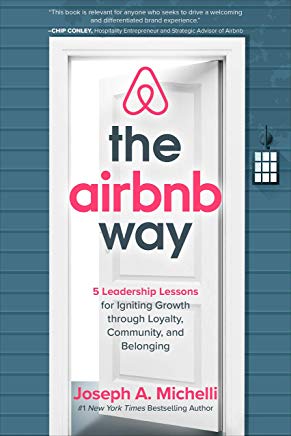Sep 24, 2019
Winning The 21st-Century Customer Experience
According to customer experience expert and New York Times bestselling author Joseph Michelli, customer satisfaction is declining due to changing customer expectations. Learn how you can improve your customer experience through convenience, personalization, and personal care.
This article was originally published on Forbes Coaches Council on Sept. 18, 2019.
Almost everyone wants to believe they have a great sense of humor. Similarly, almost all business owners want to think they are creating elevated customer experiences (CX). In both cases, the proof for those beliefs lies in the perceptions of others.
Much has been written about the benefits that come from delivering branded experiences, which differentiate your company from competitors and emotionally connect with your customers. Some of those benefits include:
- More leads
- Improved conversion of prospects into customers
- Greater customer engagement
- Ease in cross-selling other products or services
- Enhanced employee engagement
- Increased profitability
- Heightened brand equity
It is no wonder so many business leaders have identified improved customer experience as a key strategic objective.
Given the importance of customer experiences and all the efforts dedicated to improving CX, you would think that consumers would be elated by the treatment they receive from businesses. However, study after study, like the recently released American Customer Satisfaction Index (ACSI) Automotive Report (registration required), indicate “a wave of customer satisfaction declines” and plunging customer satisfaction scores.
Declines in customer experience ratings extend well beyond the automobile industry. From fast-food restaurants to hotels (registration required) and beyond, the downward spiral continues.
Having worked with and written books about brands in some of these sectors, I see declining customer satisfaction deriving from two factors:
- Constantly evolving customer expectations
- Unwieldy CX change initiatives that are not guided by an overarching customer experience strategy
To succeed today in customer experience delivery, I suggest leaders and front-line team members strive to meet customer expectations by focusing on three strategic objectives:
- Convenience
- Personalization
- Personal care
To demonstrate how disciplined attention to these three CX drivers can produce meteoric results and disrupt an entire sector, I’ll draw examples from Airbnb, the focus of my new book, The Airbnb Way. (Full disclosure: Airbnb provided assistance in sourcing the host stories featured in the book, but I have no relation with the company.)
For many business leaders, the premise behind Airbnb was laughable. How could anyone possibly succeed in a business that attempts to create a marketplace where strangers rent accommodations from strangers (sometimes as intimately as sharing a room in a home)?
Historically, however, in-home rentals to strangers have been substantial. For example, Boston Globe correspondent Ruth Graham reflected on early 19th-century lodging trends by noting, “As American cities turned into true modern metropolises in the 1830s, boarding became a way of life; social historians estimate that between a third and half of 19th-century urban resident were either boarders themselves, or took boarders into their homes.”
Convenience
Fast forward to 2007, when two design school graduates (Joe Gebbia and Brian Chesky) sought to make rent in their San Francisco apartment by offering air mattresses, untoasted Pop-Tarts and juice to prospective guests through a rudimentary website. Aided by the software development talents of their friend, Nathan Blecharczyk, the three Airbnb founders focused on making their web platform convenient and easy to use for those who sought to list and those who sought to book accommodations. Through this unrelenting focus on fast load times, intuitive navigation, uncluttered design, easy search and a well-crafted reputation system, Airbnb disrupted the way consumers book rooms on traditional travel sites. Moreover, in approximately a decade, the founders went from renting three air mattresses at $80 each per night to being a company with an estimated value of $38 billion.
Personalization
In addition to convenience, the Airbnb web platform is designed to help consumers safely and effectively make choices amid the overwhelming number of options available to them. Airbnb designers customize and curate results generated from a prospective guest’s search inquiry. Leveraging host quality ratings, guest search filters and artificial intelligence, Airbnb helps guests see properties best suited for their stated needs and unstated past preferences.
Personal Care
Since Airbnb does not hire those who deliver experiences on the Airbnb platform, leaders at the company seek to inspire hospitality (which they describe as “service with heart”). These efforts include training tools, peer forums, regional support team members and best-practice sharing. Airbnb emphasizes a magical end-to-end travel experience that transcends transactional lodging. The Airbnb model of optimal personal care is in keeping with the company’s mission to help create a world where anyone can “belong anywhere.” Elements involved in this belonging experience include a warm and authentic welcome, fulfillment and anticipation of needs and genuine care for the well-being of those served during an Airbnb travel experience. Not all Airbnb hosts deliver in accord with these goals, but the best ones do, and the brand continues to grow!
What About You?
Driving an elevated customer experience is a journey. It’s one that requires clear and manageable objectives combined with extraordinary execution in high-value areas that exceed customer expectations. For 21st-century businesses, those key areas should include convenience, personalization and personal care.
Joseph Michelli is a customer experience speaker, consultant, & New York Times #1 bestselling author. His latest book is The Airbnb Way.
Speaker
Tags

 Joseph Michelli
Joseph Michelli